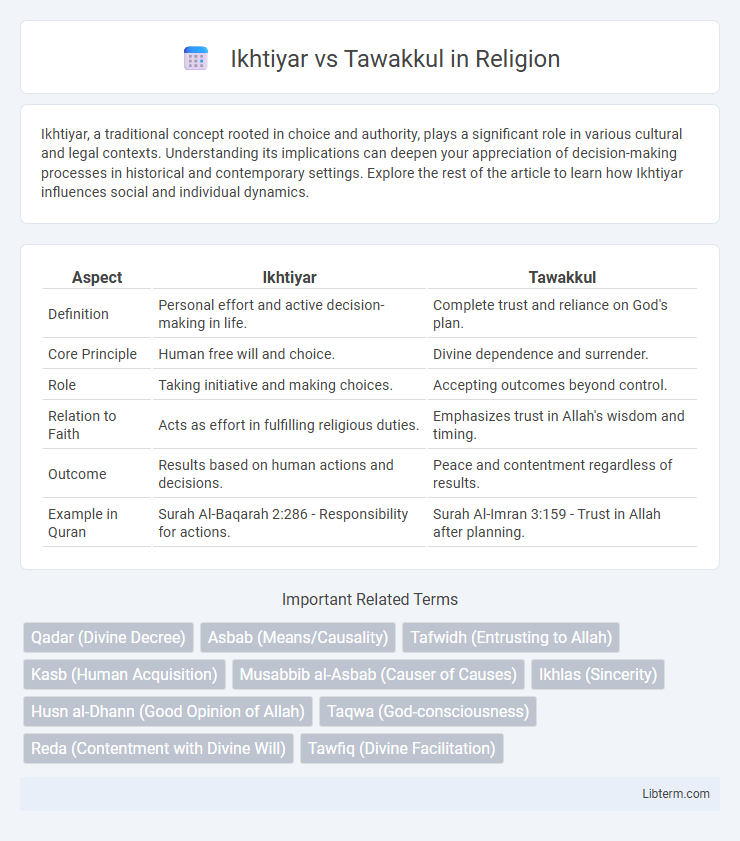Ikhtiyar, a traditional concept rooted in choice and authority, plays a significant role in various cultural and legal contexts. Understanding its implications can deepen your appreciation of decision-making processes in historical and contemporary settings. Explore the rest of the article to learn how Ikhtiyar influences social and individual dynamics.
Table of Comparison
| Aspect | Ikhtiyar | Tawakkul |
|---|---|---|
| Definition | Personal effort and active decision-making in life. | Complete trust and reliance on God's plan. |
| Core Principle | Human free will and choice. | Divine dependence and surrender. |
| Role | Taking initiative and making choices. | Accepting outcomes beyond control. |
| Relation to Faith | Acts as effort in fulfilling religious duties. | Emphasizes trust in Allah's wisdom and timing. |
| Outcome | Results based on human actions and decisions. | Peace and contentment regardless of results. |
| Example in Quran | Surah Al-Baqarah 2:286 - Responsibility for actions. | Surah Al-Imran 3:159 - Trust in Allah after planning. |
Understanding Ikhtiyar: The Concept of Human Choice
Ikhtiyar refers to the human capacity for free will and deliberate decision-making within Islamic theology, emphasizing the responsibility and accountability of individuals for their actions. This concept contrasts with tawakkul, which centers on complete reliance and trust in Allah's decree while still engaging in effort. Understanding ikhtiyar highlights the balance between human initiative and divine predestination, underscoring that humans must actively choose their paths while maintaining faith in God's wisdom.
Tawakkul Defined: Trusting in Divine Will
Tawakkul, in Islamic spirituality, is defined as placing complete trust and reliance on Divine Will while recognizing human effort's role through Ikhtiyar, or personal initiative. This balance ensures believers actively pursue goals with sincere effort yet surrender outcomes to Allah's wisdom and plan. Such trust fosters inner peace, resilience, and unwavering faith amid life's uncertainties.
Historical Perspectives on Ikhtiyar and Tawakkul
Historical perspectives on Ikhtiyar and Tawakkul in Islamic thought reveal a nuanced balance between human effort and divine reliance. Ikhtiyar, meaning personal choice or effort, has been emphasized by classical scholars like Al-Ghazali to underline responsibility in decision-making and ethical behavior. Tawakkul, or reliance on God, complements Ikhtiyar by encouraging believers to trust divine wisdom after exerting their utmost efforts, as reflected in early Islamic jurisprudence and Sufi traditions.
Ikhtiyar vs Tawakkul: Core Differences
Ikhtiyar refers to human effort and conscious decision-making in pursuing goals, whereas Tawakkul denotes reliance on divine will after exerting necessary efforts. The core difference lies in Ikhtiyar emphasizing proactive action and personal responsibility, while Tawakkul centers on trust and surrender to God's plan. Balancing Ikhtiyar and Tawakkul fosters a harmonious approach combining diligence with spiritual trust.
Finding Balance: Integrating Effort and Reliance
Ikhtiyar emphasizes proactive effort in decision-making, while Tawakkul centers on trusting divine wisdom after exerting personal endeavor. Finding balance requires aligning sincere action with heartfelt reliance on God's plan, recognizing human responsibility without neglecting spiritual submission. This integration fosters resilience and clarity, blending purposeful striving with serene acceptance of outcomes.
Qur’anic Teachings on Choice and Trust
The Qur'an emphasizes Ikhtiyar as human responsibility to make conscious choices based on reason and moral guidance, highlighting verses such as Surah Al-Baqarah 2:286 which underscores individual accountability. Tawakkul is presented as reliance on Allah's wisdom and power after exerting sincere effort, illustrated in Surah Al-Imran 3:159 where trusting Allah complements deliberate action. Together, these concepts encapsulate the balance between proactive decision-making (Ikhtiyar) and spiritual trust (Tawakkul), fostering a holistic approach to faith-driven conduct.
Ikhtiyar and Tawakkul in Daily Life Decisions
Ikhtiyar represents the proactive effort and deliberate choice-making in daily life decisions, emphasizing personal responsibility and strategic planning to achieve desired outcomes. Tawakkul complements ikhtiyar by fostering trust and reliance on divine wisdom after making informed decisions, reducing anxiety about uncertainties beyond human control. Balancing ikhtiyar and tawakkul enables individuals to act decisively while maintaining inner peace, integrating practical action with spiritual surrender in everyday challenges.
Spiritual Benefits of Practicing Tawakkul
Practicing Tawakkul cultivates profound spiritual resilience by inspiring trust in divine wisdom while maintaining proactive effort, aligning believers with inner peace and reduced anxiety. This spiritual reliance enhances humility and gratitude, fostering a closer connection with God and deeper faith in life's unfolding. Tawakkul empowers individuals to surrender outcomes without despair, promoting mental clarity and emotional balance through spiritual surrender.
Misconceptions about Ikhtiyar and Tawakkul
Many people misconceive Ikhtiyar as solely human effort without divine reliance, while Tawakkul is often misunderstood as passive submission without personal initiative. Ikhtiyar involves proactive decision-making combined with trust in Allah's wisdom, and Tawakkul means putting sincere effort followed by reliance on Allah's decree. Recognizing that true Tawakkul includes Ikhtiyar clarifies their complementary nature rather than opposition.
Ikhtiyar and Tawakkul: A Holistic Approach to Faith
Ikhtiyar refers to the conscious exercise of free will and personal effort in decision-making, while Tawakkul embodies complete reliance on divine wisdom and trust in God's plan. Balancing Ikhtiyar and Tawakkul fosters a holistic approach to faith, encouraging individuals to actively pursue goals while surrendering outcomes to divine will. This dynamic interplay strengthens spiritual resilience, emphasizing human responsibility paired with unwavering trust in God's guidance.
Ikhtiyar Infographic

 libterm.com
libterm.com